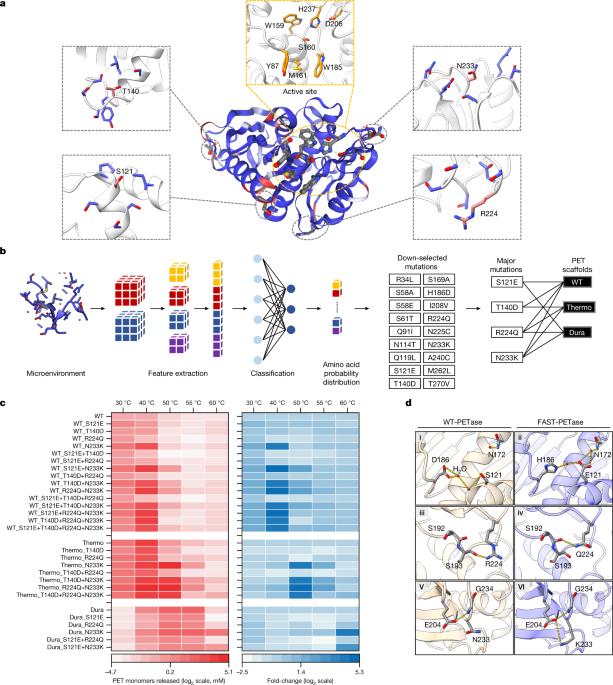Machine learning-aided engineering of hydrolases for PET depolymerization
IF 50.5
1区 综合性期刊
Q1 MULTIDISCIPLINARY SCIENCES
引用次数: 284
Abstract
Plastic waste poses an ecological challenge1–3 and enzymatic degradation offers one, potentially green and scalable, route for polyesters waste recycling4. Poly(ethylene terephthalate) (PET) accounts for 12% of global solid waste5, and a circular carbon economy for PET is theoretically attainable through rapid enzymatic depolymerization followed by repolymerization or conversion/valorization into other products6–10. Application of PET hydrolases, however, has been hampered by their lack of robustness to pH and temperature ranges, slow reaction rates and inability to directly use untreated postconsumer plastics11. Here, we use a structure-based, machine learning algorithm to engineer a robust and active PET hydrolase. Our mutant and scaffold combination (FAST-PETase: functional, active, stable and tolerant PETase) contains five mutations compared to wild-type PETase (N233K/R224Q/S121E from prediction and D186H/R280A from scaffold) and shows superior PET-hydrolytic activity relative to both wild-type and engineered alternatives12 between 30 and 50 °C and a range of pH levels. We demonstrate that untreated, postconsumer-PET from 51 different thermoformed products can all be almost completely degraded by FAST-PETase in 1 week. FAST-PETase can also depolymerize untreated, amorphous portions of a commercial water bottle and an entire thermally pretreated water bottle at 50 ºC. Finally, we demonstrate a closed-loop PET recycling process by using FAST-PETase and resynthesizing PET from the recovered monomers. Collectively, our results demonstrate a viable route for enzymatic plastic recycling at the industrial scale. Untreated, postconsumer-PET from 51 different thermoformed products can all be almost completely degraded by FAST-PETase in 1 week and PET can be resynthesized from the recovered monomers, demonstrating recycling at the industrial scale.

PET解聚水解酶的机器学习辅助工程
塑料废弃物给生态环境带来了挑战1-3,而酶降解为聚酯废弃物的回收利用提供了一条潜在的绿色可扩展途径4。聚对苯二甲酸乙二醇酯(PET)占全球固体废物的 12%5 ,理论上可以通过快速酶解聚酯,然后再聚合或转化/增值为其他产品,实现 PET 的循环碳经济6-10。然而,由于 PET水解酶对 pH 值和温度范围的适应性不强、反应速度缓慢以及无法直接使用未经处理的消费后塑料,因此 PET水解酶的应用一直受到阻碍11。在这里,我们利用基于结构的机器学习算法,设计出了一种稳健而活跃的 PET水解酶。与野生型 PET 酶相比,我们的突变体和支架组合(FAST-PETase:功能性、活性、稳定性和耐受性 PET 酶)包含五个突变(预测中的 N233K/R224Q/S121E 和支架中的 D186H/R280A),并在 30 至 50 °C 和一系列 pH 值范围内显示出比野生型和工程替代品更优越的 PET 水解活性12。我们证明,来自 51 种不同热成型产品的未经处理的消费后 PET 几乎都能在一周内被 FAST-PETase 完全降解。FAST-PETase 还能在 50 ºC 的温度下解聚未经处理的商用水瓶无定形部分和经过热预处理的整个水瓶。最后,我们展示了一种闭环 PET 回收工艺,即使用 FAST-PETase 并从回收的单体中重新合成 PET。总之,我们的研究结果证明了在工业规模上进行酶法塑料回收的可行途径。来自 51 种不同热成型产品的未经处理的消费后 PET 均可在 1 周内被 FAST-PETase 几乎完全降解,并可从回收的单体中重新合成 PET,展示了工业规模的回收利用。
本文章由计算机程序翻译,如有差异,请以英文原文为准。
求助全文
约1分钟内获得全文
求助全文
来源期刊

Nature
综合性期刊-综合性期刊
CiteScore
90.00
自引率
1.20%
发文量
3652
审稿时长
3 months
期刊介绍:
Nature is a prestigious international journal that publishes peer-reviewed research in various scientific and technological fields. The selection of articles is based on criteria such as originality, importance, interdisciplinary relevance, timeliness, accessibility, elegance, and surprising conclusions. In addition to showcasing significant scientific advances, Nature delivers rapid, authoritative, insightful news, and interpretation of current and upcoming trends impacting science, scientists, and the broader public. The journal serves a dual purpose: firstly, to promptly share noteworthy scientific advances and foster discussions among scientists, and secondly, to ensure the swift dissemination of scientific results globally, emphasizing their significance for knowledge, culture, and daily life.
 求助内容:
求助内容: 应助结果提醒方式:
应助结果提醒方式:


